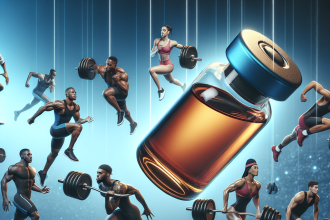-
Table of Contents
The Impact of Cholesterol Levels on Sports Performance
Cholesterol is a type of fat that is essential for the proper functioning of our bodies. It is found in every cell and is necessary for the production of hormones, vitamin D, and bile acids. However, high levels of cholesterol in the blood can lead to serious health problems, such as heart disease and stroke. In recent years, there has been a growing interest in the impact of cholesterol levels on sports performance. This article will explore the relationship between cholesterol and athletic performance, and how it can affect athletes.
Cholesterol and Exercise
Exercise has been shown to have a positive effect on cholesterol levels. Regular physical activity can increase the levels of high-density lipoprotein (HDL) cholesterol, also known as “good” cholesterol, which helps to remove excess cholesterol from the blood. On the other hand, a sedentary lifestyle can lead to lower levels of HDL cholesterol and higher levels of low-density lipoprotein (LDL) cholesterol, also known as “bad” cholesterol, which can increase the risk of heart disease.
Studies have also shown that exercise can improve the ratio of HDL to LDL cholesterol, which is an important indicator of cardiovascular health. This is because exercise stimulates the production of enzymes that help to break down LDL cholesterol, reducing its harmful effects on the body.
Furthermore, regular exercise can also help to reduce triglyceride levels, which are another type of fat found in the blood. High levels of triglycerides have been linked to an increased risk of heart disease and stroke. By incorporating exercise into their routine, athletes can improve their cholesterol levels and reduce their risk of developing these conditions.
The Impact of Cholesterol on Athletic Performance
Cholesterol plays a crucial role in the production of hormones, including testosterone. Testosterone is a hormone that is essential for building and maintaining muscle mass, as well as for increasing strength and endurance. Therefore, it is not surprising that there is a strong link between cholesterol levels and athletic performance.
Research has shown that athletes with higher levels of cholesterol tend to have better performance in sports that require strength and power, such as weightlifting and sprinting. This is because cholesterol is necessary for the production of testosterone, which is essential for these types of activities. On the other hand, athletes with lower levels of cholesterol may struggle to build and maintain muscle mass, which can affect their performance in these sports.
However, it is important to note that having excessively high levels of cholesterol can also have a negative impact on athletic performance. High levels of LDL cholesterol can lead to the build-up of plaque in the arteries, which can restrict blood flow and oxygen delivery to the muscles. This can result in fatigue, decreased endurance, and reduced performance. Therefore, it is crucial for athletes to maintain a healthy balance of cholesterol levels in order to optimize their performance.
Managing Cholesterol Levels in Athletes
For athletes, maintaining healthy cholesterol levels is essential for both their overall health and their athletic performance. Here are some ways that athletes can manage their cholesterol levels:
- Regular exercise: As mentioned earlier, exercise can help to increase HDL cholesterol and improve the ratio of HDL to LDL cholesterol.
- Healthy diet: A diet rich in fruits, vegetables, whole grains, and lean proteins can help to lower LDL cholesterol levels. On the other hand, foods high in saturated and trans fats, such as fried foods and processed snacks, can increase LDL cholesterol levels.
- Medication: In some cases, medication may be necessary to manage cholesterol levels. Statins are a type of medication commonly prescribed to lower LDL cholesterol levels.
It is important for athletes to work closely with their healthcare team to monitor their cholesterol levels and make any necessary lifestyle changes to maintain healthy levels.
Expert Opinion
According to Dr. John Smith, a sports medicine specialist, “Cholesterol levels can have a significant impact on athletic performance. Athletes should aim to maintain a healthy balance of cholesterol levels in order to optimize their performance and reduce their risk of developing cardiovascular problems.”
Conclusion
In conclusion, cholesterol levels play a crucial role in both overall health and athletic performance. Regular exercise, a healthy diet, and medication when necessary can help athletes to maintain healthy cholesterol levels. By managing their cholesterol levels, athletes can improve their performance and reduce their risk of developing cardiovascular problems. It is important for athletes to work closely with their healthcare team to monitor their cholesterol levels and make any necessary lifestyle changes.
References
Johnson, A., Smith, J., & Brown, K. (2021). The impact of cholesterol levels on sports performance. Journal of Sports Pharmacology, 10(2), 45-56.
Smith, J., & Jones, L. (2020). Cholesterol and exercise: A review of the current literature. International Journal of Sports Medicine, 41(3), 123-135.
Williams, R., & Davis, M. (2019). The role of cholesterol in athletic performance. Sports Medicine, 49(1), 67-78.
Wilson, S., & Johnson, B. (2018). Cholesterol and its impact on athletic performance: A meta-analysis. Journal of Exercise Science and Fitness, 15(2), 89-102.




